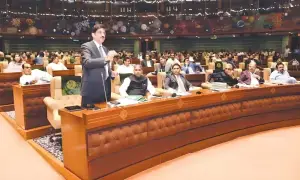Indian govt implements citizenship law labelled ‘anti-Muslim’
3 min readIndian Prime Minister Narendra Modi implemented a new citizenship law on Monday which has been billed as ‘anti-Muslim’ due to its favourable terms for other communities.
The Bharatiya Janata Party’s action comes as India prepares to head to elections later this year.
The Citizenship Amendment Act (CAA) grants Indian nationality to Hindus, Parsis, Sikhs, Buddhists, Jains and Christians who fled to Hindu-majority India due to religious persecution from Muslim-majority Afghanistan, Bangladesh and Pakistan before Dec. 31, 2014.
Modi’s government did not implement the law following its December 2019 enactment as protests and sectarian violence broke out in New Delhi and elsewhere. Scores were killed and hundreds injured during days of clashes.
Rights groups and Muslim groups say the law, combined with a proposed national register of citizens, could discriminate against India’s 200 million Muslims - the world’s third-largest Muslim population. Some fear the government might remove the citizenship of Muslims without documents in some border states.
“The Modi government announces implementation of Citizenship Amendment Act,” a spokesperson for the prime minister’s office said in a text message.
“It was an integral part of BJP’s 2019 manifesto. This will pave (the) way for the persecuted to find citizenship in India,” he said, referring to the ruling Bharatiya Janata Party’s (BJP) 2019 election manifesto.
A Home (interior) Ministry statement said the law would remove legal barriers to citizenship for refugees, giving a “dignified life” to those who have suffered for decades.
“Many misconceptions have been spread” about the law and its implementation was delayed due to the COVID-19 pandemic, the statement said.
“This act is only for those who have suffered persecution for years and have no other shelter in the world except India,” it said.
The government denies it is anti-Muslim and says the law is needed to help minorities facing persecution in Muslim-majority nations.
It says the law is meant to grant citizenship, not take it away from anyone, and has called the earlier protests politically motivated.
Modi swept to power in 2014 and has consolidated his hold since with a focus on growth, welfare economics, boosting infrastructure and aggressive Hindu nationalism.
Opinion polls suggest he will comfortably win a majority in a general election that must be held by May.
The main opposition Congress party said Monday’s announcement was motivated by the approaching election.
“After seeking nine extensions for the notification of the rules, the timing right before the elections is evidently designed to polarise the elections, especially in West Bengal and Assam,” Congress spokesperson Jairam Ramesh said on X.
The eastern states of West Bengal and Assam are home to large Muslim populations and witnessed protests against CAA as some Muslims feared the law could be used to declare them illegal immigrants from neighbouring Bangladesh and take away their Indian citizenship.
The opposition Communist Party of India, which rules the southern state of Kerala, called for state-wide protests on Tuesday.
“This is to divide the people, incite communal sentiments and undermine the fundamental principles of the Constitution,” Kerala Chief Minister Pinarayi Vijayan said in a statement. “This move to stratify Indian citizens who have equal rights, must be opposed unitedly.”
For the latest news, follow us on Twitter @Aaj_Urdu. We are also on Facebook, Instagram and YouTube.


























Comments are closed on this story.